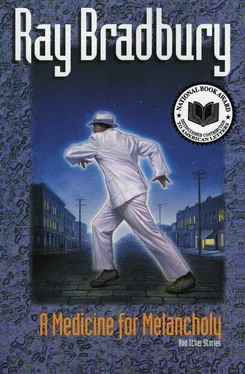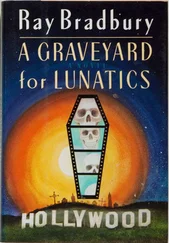“Careful!” screamed Mrs. Wilkes. “Ah, she’s dead! No. There. Put her down. Easy …”
And at last the bed was tilted against the house front so that the River of Humanity surging by could see Camillia, a large pale Bartolemy Doll put out like a prize in the sun.
“Fetch a quill, ink, paper, lad,” said the father. “I’ll make notes as to symptoms spoken of and remedies offered this day. Tonight we’ll average them out. Now—”
But already a man in the passing crowd had fixed Camillia with a sharp eye.
“She’s sick!” he said.
“Ah,” said Mr. Wilkes, gleefully. “It begins. The quill, boy. There. Go on, sir!”
“She’s not well.” The man scowled. “She does poorly.”
“Does poorly—” Mr. Wilkes wrote, then froze. “Sir?” He looked up suspiciously. “Are you a physician?”
“I am, sir.”
“I thought I knew the words! Jamie, take my cane, drive him off! Go, sir, be gone!”
But the man hastened off, cursing, mightily exasperated.
“She’s not well, she does poorly … pah!” mimicked Mr. Wilkes, but stopped. For now a woman, tall and gaunt as a specter fresh risen from the tomb, was pointing a finger at Camillia Wilkes.
“Vapors,” she intoned.
“Vapors,” wrote Mr. Wilkes, pleased.
“Lung-flux,” chanted the woman.
“Lung-flux!” Mr. Wilkes wrote, beaming. “Now, that’s more like it!”
“A medicine for melancholy is needed,” said the woman palely. “Be there mummy ground to medicine in your house? The best mummies are: Egyptian, Arabian, Hirasphatos, Libyan, all of great use in magnetic disorders. Ask for me, the Gypsy, at the Flodden Road. I sell stone parsley, male frankincense—”
“Flodden Road, stone parsley—slower, woman!”
“Opobalsam, pontic valerian—”
“Wait, woman! Opobalsam, yes! Jamie, stop her!”
But the woman, naming medicines, glided on.
A girl, no more than seventeen, walked up now and stared at Camillia Wilkes.
“She—”
“One moment!” Mr. Wilkes scribbled feverishly. “—magnetic disorders—pontic valerian—drat! Well, young girl, now. What do you see in my daughter’s face? You fix her with your gaze, you hardly breathe. So?”
“She—” The strange girl searched deep into Camillia’s eyes, flushed, and stammered. “She suffers from … from …”
“Spit it out!”
“She … she … oh!”
And the girl, with a last look of deepest sympathy, darted off through the crowd.
“Silly girl!”
“No, Papa,” murmured Camillia, eyes wide. “Not silly. She saw . She knew . Oh, Jamie, run fetch her, make her tell!”
“No, she offered nothing! Whereas, the Gypsy, see her list!”
“I know it, Papa.” Camillia, paler, shut her eyes.
Someone cleared his throat.
A butcher, his apron a scarlet battleground, stood bristling his fierce mustaches there.
“I have seen cows with this look,” he said. “I have saved them with brandy and three new eggs. In winter I have saved myself with the same elixir—”
“My daughter is no cow, sir!” Mr. Wilkes threw down his quill. “Nor is she a butcher, nor is it January! Step back, sir, others wait!”
And indeed, now a vast crowd clamored, drawn by the others, aching to advise their favorite swig, recommend some country site where it rained less and shone more sun than in all England or your South of France. Old men and women, especial doctors as all the aged are, clashed by each other in bristles of canes, in phalanxes of crutches and hobble sticks.
“Back!” cried Mrs. Wilkes, alarmed. “They’ll crush my daughter like a spring berry!”
“Stand off!” Jamie seized canes and crutches and threw them over the mob, which turned on itself to go seek their missing members.
“Father, I fail, I fail,” gasped Camillia.
“Father!” cried Jamie. “There’s but one way to stop this riot! Charge them! Make them pay to give us their mind on this ailment!”
“Jamie, you are my son! Quick, boy, paint a sign! Listen, people! Tuppence! Queue up please, a line! Tuppence to speak your piece! Get your money out, yes! That’s it. You, sir. You, madame. And you, sir. Now, my quill! Begin!”
The mob boiled in like a dark sea.
Camillia opened one eye and swooned again.
Sundown, the streets almost empty, only a few strollers now. Camillia moth-fluttered her eyelids at a familiar clinking jingle.
“Three hundred and ninety-nine, four hundred pennies!” Mr. Wilkes counted the last money into a bag held by his grinning son. “There!”
“It will buy me a fine black funeral coach,” said the pale girl.
“Hush! Did you imagine, family, so many people, two hundred, would pay to give us their opinion?”
“Yes,” said Mrs. Wilkes. “Wives, husbands, children, are deaf to each other. So people gladly pay to have someone listen. Poor things, each today thought he and he alone knew quinsy, dropsy, glanders, could tell the slaver from the hives. So tonight we are rich and two hundred people are happy, having unloaded their full medical kit at our door.”
“Gods, instead of quelling the riot, we had to drive them off snapping like pups.”
“Read us the list, Father,” said Jamie, “of two hundred remedies. Which one is true?”
“I care not,” whispered Camillia, sighing. “It grows dark. My stomach is queasy from listening to the names! May I be taken upstairs?”
“Yes, dear. Jamie, lift!”
“Please,” said a voice.
Half-bent, the men looked up.
There stood a Dustman of no particular size or shape, his face masked with soot from which shone water-blue eyes and a white slot of an ivory smile. Dust sifted from his sleeves and his pants as he moved, as he talked quietly, nodding.
“I couldn’t get through the mob earlier,” he said, holding his dirty cap in his hands. “Now, going home, here I am. Must I pay?”
“No, Dustman, you need not,” said Camillia gently.
“Hold on—” protested Mr. Wilkes.
But Camillia gave him a soft look and he grew silent.
“Thank you, ma’am.” The Dustman’s smile flashed like warm sunlight in the growing dusk. “I have but one advice.”
He gazed at Camillia. She gazed at him.
“Be this Saint Bosco’s Eve, sir, ma’am?”
“Who knows? Not me , sir!” said Mr. Wilkes.
“I think it is Saint Bosco’s Eve, sir. Also, it is the night of the Full Moon. So,” said the Dustman humbly, unable to take his eyes from the lovely haunted girl, “you must leave your daughter out in the light of that rising moon.”
“Out under the moon!” said Mrs. Wilkes.
“Doesn’t that make the lunatic?” asked Jamie.
“Beg pardon, sir.” The Dustman bowed. “But the full moon soothes all sick animal, be they human or plain field beast. There is a serenity of color, a quietude of touch, a sweet sculpturing of mind and body in full moonlight.”
“It may rain—” said the mother uneasily.
“I swear,” said the Dustman quickly. “My sister suffered this same swooning paleness. We set her like a potted lily out one spring night with the moon. She lives today in Sussex, the soul of reconstituted health!”
“Reconstituted! Moonlight! And will cost us not one penny of the four hundred we collected this day, Mother, Jamie, Camillia.”
“No!” said Mrs. Wilkes. “I won’t have it!”
“Mother,” said Camillia.
She looked earnestly at the Dustman.
From his grimed face the Dustman gazed back, his smile like a little scimitar in the dark.
“Mother,” said Camillia. “I feel it. The moon will cure me, it will, it will....”
The mother sighed. “This is not my day, nor night. Let me kiss you for the last time, then. There.”
Читать дальше












